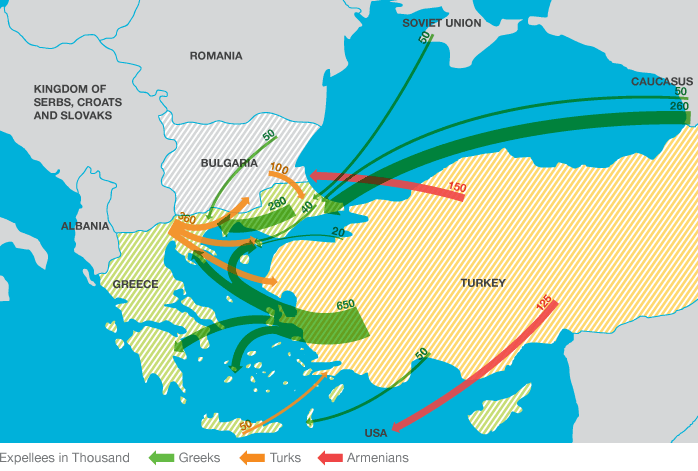
Kurds in turkey
In the transition from empire to state, Turkey's Kurds (and other groups) were left out. The Republic of Turkey formed in 1923 and the burgeoning secular state was required to adhere to a minority policy laid out in the Treaty of Lausanne.
Treaty of Lausanne [3]

The Turkish Government undertakes to assure full and complete protection of life and liberty to all inhabitants of Turkey without distinction of birth, nationality, language, race or religion. All inhabitants of Turkey shall be entitled to free exercise, whether in public or private, of any creed, religion or belief, the observance of which shall not be incompatible with public order and good morals.
Article 38

Differences of religion, creed or confession shall not prejudice any Turkish national in matters relating to the enjoyment of civil or political rights, as, for instance, admission to public employments, functions and honours, or the exercise of professions and industries.
No restrictions shall be imposed on the free use by any Turkish national of any language in private intercourse, in commerce, religion, in the press, or in publications of any kind or at public meetings.
No restrictions shall be imposed on the free use by any Turkish national of any language in private intercourse, in commerce, religion, in the press, or in publications of any kind or at public meetings.
Article 39

Turkish nationals belonging to non-Moslem minorities shall not be compelled to perform any act which constitutes a violation of their faith or religious observances, and shall not be placed under any disability by reason of their refusal to attend Courts of Law or to perform any legal business on their weekly day of rest.
Article 43

When the Republic of Turkey was born, leaders knew they needed to prop up nationalist sentiment in order for the former Ottoman Empire to regain its strength and unity. Therefore ll those living within the borders of the Republic were now deemed "Turks," and all Muslim ethnic and Muslim religious minority groups were homogenized in government rhetoric in an attempt to herd the public into support for the new state.
This movement was a departure from the millet system, and the Turkish brand of nationalism rejected the existence of other ethnic and religious minorities in its policy. Not too surprisingly, this has led to many violations of the Treaty of Lausanne.
Blind Legislation
Law Concerning Publications and Broadcasts in Languages Other Than Turkish (1983)
Explicitly declared Turkish as the mother tongue, forbade use of any other language as such and prohibited publishing in Kurdish. [4]
Click to Learn
Erdogon's Law to Remove Immunity for MPS (2016)
Many are concerned this law is just a means to remove pro-Kurdish members of parliament. More Here. [5]
Click to Learn

Alevis in turkey
Although the nationalist movement of the Republic of Turkey was meant to be a secular one, it is undeniable that religion – and namely, Sunni Islam – are deeply rooted in this definition. The Population Exchanges between the Greece and Turkey in 1923 illustrate this very well, as all inland, ethnically Turkish Christians were sent to Greece.
 |  |
|---|---|
 |
Cultural Annihilation
Compulsary Education on Sunni Islam Is Forced Assimilation
Unlike Jewish and Christian children, Alevi children are not excused from participating in/learning about Sunni Islam in school. [2]
Click to Learn
This is problematic because the direct state sponsorship of Sunni mosques and refusal to pay to build/maintain Cemevis is an attempt to assimilate the Alevis. All Cemevis are then paid for by donations + the Alevi community.
No State Funding to Build/Maintain Places of Worship
Cemevis have just been acknowledged by Turkish cities as places of worship as of 2015. Still they are not tax-payer funded, unlike mosques. [2]

Violence

Sivas Massacre
July 2, 1993
Event of Alevi intellectuals at a hotel targeted by mob. 35 victims, while the Turkish police stood idly by at the scene. [6]
Violence against Alevis in Turkey

Hightened Tensions Today
Violent civilian altercations between Alevis and Sunni Turks. The Alevi community is wary of their hypervisibility during Ramadan, which they do not celebrate. The period of Ramadan has seen an increase in violence in Turkey as the country moves ever closer to becoming an Islamist nation. [7]
Popular Opinion of non-Sunni Muslims Worsens
[2]Paul and Seyrek, “Freedom of religion in Turkey – The Alevi issue,” 4.
[3]Lausanne Treaty. July 24, 1923. http://wwi.lib.byu.edu/index.php/Treaty_of_Lausanne.
[4]Law on Fights Against Terrorism of Turkey, Act Nr. 3713. 1991. www.legislationline.org/documents/id/16875.
[5]"Merkel 'concern' over Turkey's 'anti-Kurdish' law." BBC News. May 23, 2016. Accessed June 25, 2016.
[6]Veli Sirin. "Islam Today: Alevis in Turkey - Victims of Islamist Discrimination." Gatestone Institute. May 22, 2009. Accessed June 25, 2016. http://www.gatestoneinstitute.org/521/islam-today-alevis-in-turkey---victims-of-islamist-discrimination
[7]"Ramadan no longer a month of peace, serenity in Turkey." June 20, 2016. http://www.al-monitor.com/pulse/originals/2016/06/turkey-hate-speech-ramadan-violence-spreading.html#ixzz4CeRdqGd0.